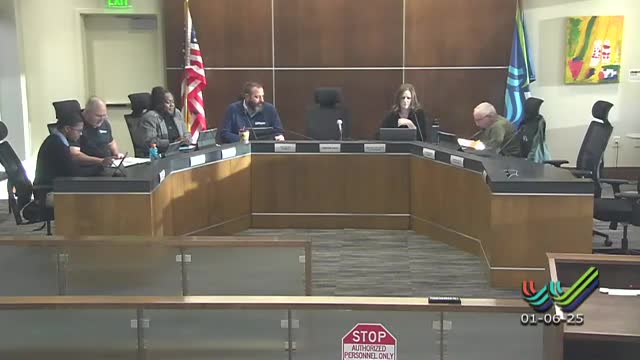Waterloo council continues debate on parking hours, rates and citation policy
Get AI-powered insights, summaries, and transcripts
Subscribe
Summary
At a Jan. work session, councilmembers, staff and downtown stakeholders debated proposed changes to enforcement hours, free-parking windows, hourly rates and citation penalties as City Finance Director Bridal Wood presented a consultant-backed package intended to move the parking system toward self-sufficiency.
Waterloo City Council members, city staff and downtown stakeholders spent the Jan. work session discussing proposed changes to the city's parking enforcement hours, on-street and ramp rates, citation structure and related ordinance language.
City Finance Director Bridal Wood opened the presentation by summarizing the proposals and the goals: define enforcement hours and days, set free-parking length (if any), update on-street and ramp rates, and revise citation fees and traffic-code language. Wood said the consultant recommended 90 minutes of free on-street parking but cautioned "free parking doesn't attract people," and that the broader objective is for the parking system to cover operations and eventually capital improvements.
The discussion centered on several budget and operational details. Wood said year-to-date parking operations show a $76,000 net loss through Dec. 31, 2025. Councilmembers asked whether a $1-per-hour on-street rate (up from the current 50¢ for an hour) or a $3 daily ramp rate would be sufficient to reduce deficits, and whether increasing citation fees could help balance the books. The consultant's cited approach for citation fines was that an initial citation should be "equal to double what it would be to park on the street for the entire day," a method that generated examples in the presentation of $20, $40 and $60 fines.
Councilmember Bozen said he would have preferred to receive the questions and materials in advance: "I actually would have liked these questions before the start of the meeting," and expressed skepticism about a 90-minute free window, saying it could discourage ramp use and complicate enforcement. Several councilmembers urged simplicity. Councilmember Chiles said, "Simplify it the best you can. Make it, you know, simple is better," and recommended keeping to two citations per vehicle per day, as the city currently allows.
David Deeds of JSA Development, who identified himself as a member of the parking committee, urged councilmembers to consider the economic-development tradeoffs of parking policy. "The decisions you make here aren't just about the budget impact but also about how it affects the customers and those people who are operating businesses in these spaces," Deeds said, and he recommended incremental changes: adjust rates and payment methods before altering enforcement hours.
Operational and implementation details discussed included: - Enforcement window proposals: current 9 a.m.–5 p.m. versus a proposed 10 a.m.–7 p.m., with enforcement effectively starting at 11:30 a.m. if a 90-minute free-registration period is adopted; several councilmembers preferred keeping current hours or only modest shifts. Wood explained the consultant's 10–7 proposal and that an initial 90-minute free-registration period would delay enforcement until 11:30 a.m. - Payment and technology: kiosk and mobile-app behavior was discussed. Wood said registering a plate at kiosks would not incur a transaction fee, while app or text payments typically incur a small fee (reported around 25–35¢). The city has reduced kiosks from 21 to 20; leftover kiosk funds plus interest would be applied to upgrade the license-plate-recognition (LPR) system, and remaining expenses would be handled through a budget amendment. - Staffing and enforcement: the city currently has one dedicated citation officer; meter coin collection and ramp maintenance are done by separate staff. Councilmembers asked how enforcement frequency would be handled under plate-based registration (for example, how often an officer could reissue citations to the same vehicle) and whether the city should offer a short post-implementation forgiveness period to allow residents and visitors to adjust. - Ramp and convention-center revenue: councilmembers raised a long-standing issue that hotel or development agreements have left many ramp spaces blocked or assigned without the city receiving comparable revenue. Wood and councilmembers noted prior discussions of a development agreement that would have charged the hotel $5 per space per month; councilmembers said that arrangement provides far less revenue than standard ramp pricing and is reducing annual parking revenue—one estimate cited an expected $33,000 annual impact from removing roughly 70 spaces.
Councilmembers repeatedly emphasized making rates and enforcement simple and predictable, coordinating with downtown businesses and the convention center on bundled parking for events, and phasing changes incrementally so the city and the public can adjust. Several also recommended collecting more usage data from the Passport payment system (reports are available for app transactions) to determine how long vehicles typically park on different blocks and whether a $1 hourly rate would materially reduce the deficit.
No ordinance changes or fee increases were adopted at the work session; the meeting focused on questions and staff follow-up. Councilmembers asked staff to provide additional data and to share the consultant pages referenced in the December study so the council can evaluate revenue impacts before final decisions.
Votes taken at the meeting were limited to procedural items: the council approved the meeting agenda and Dec. 16, 2024, work-session minutes at the start of the session and later voted to adjourn the work session.
The council directed staff to gather the requested reports, confirm the remaining funding plan for the LPR upgrade, and continue discussions with the convention center and hotel representatives about ramp-space agreements. Staff said they would pull Passport usage reports and provide the specific pages of the consultant's parking study referenced in the discussion.
